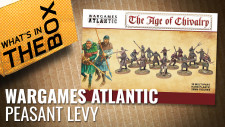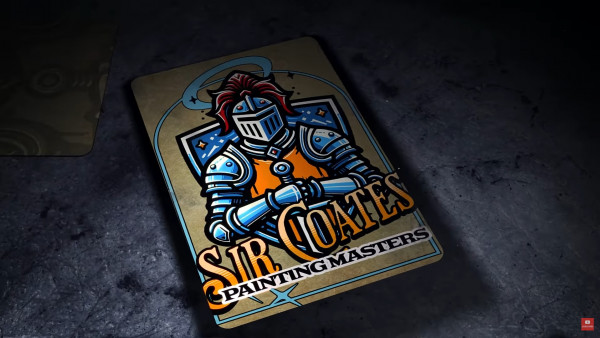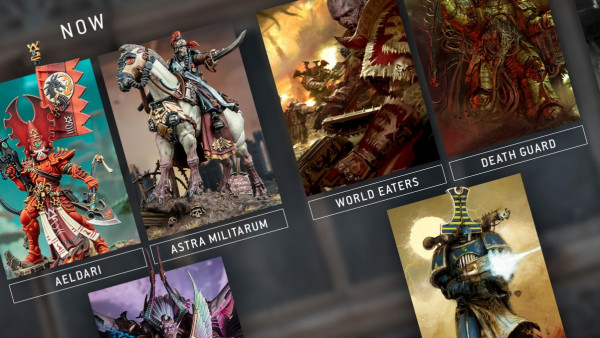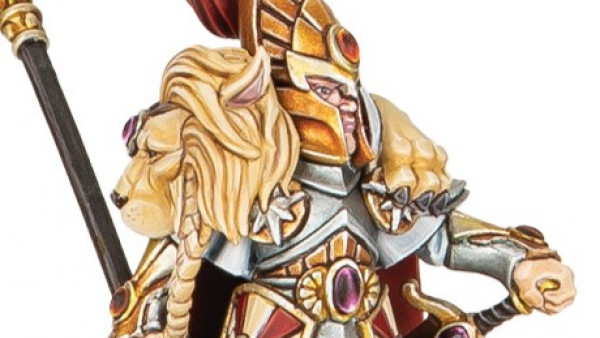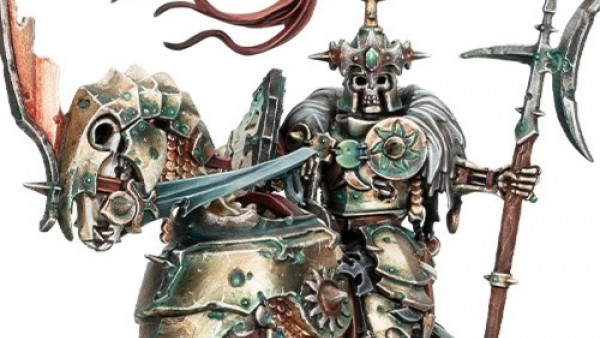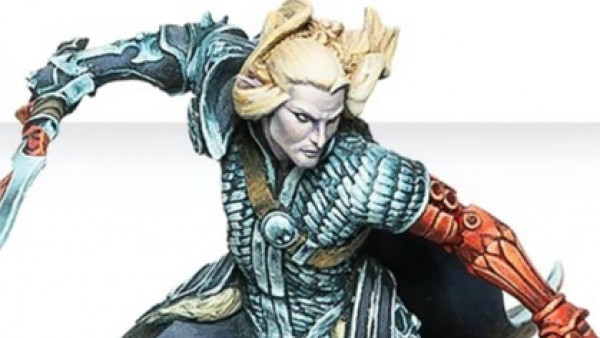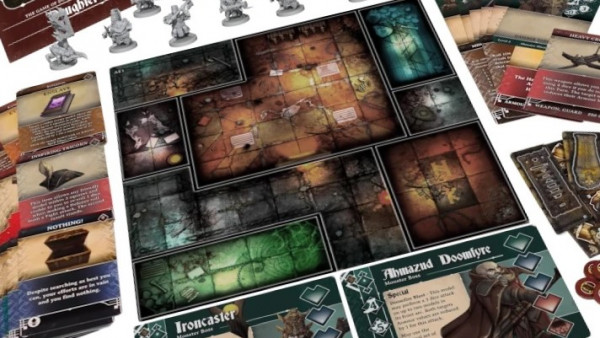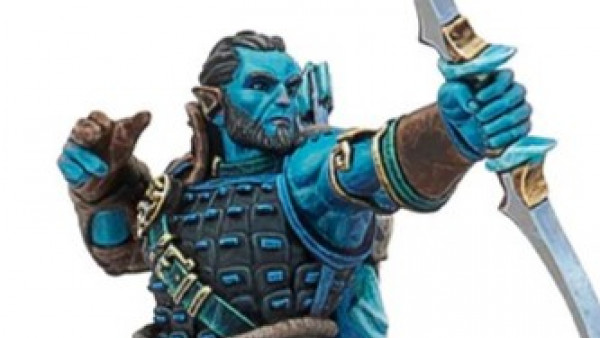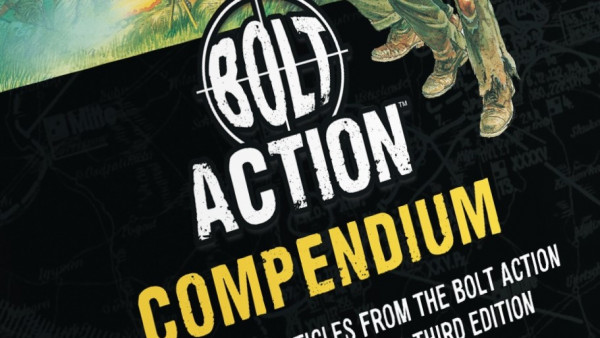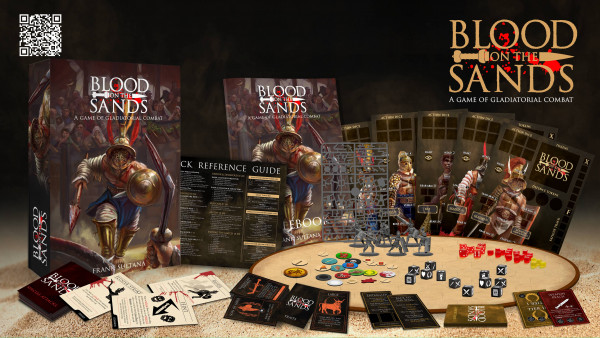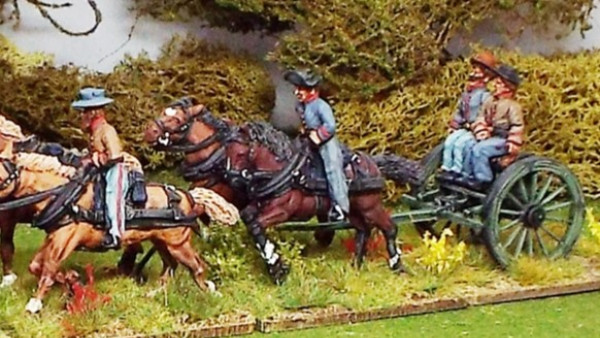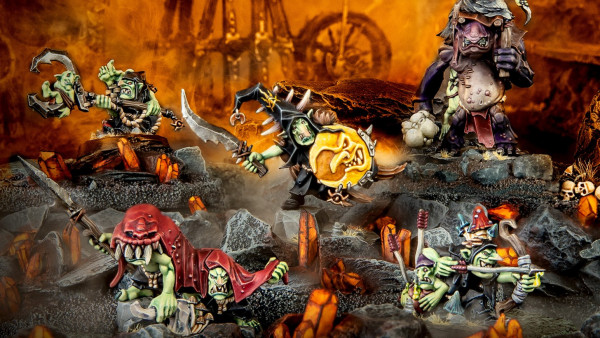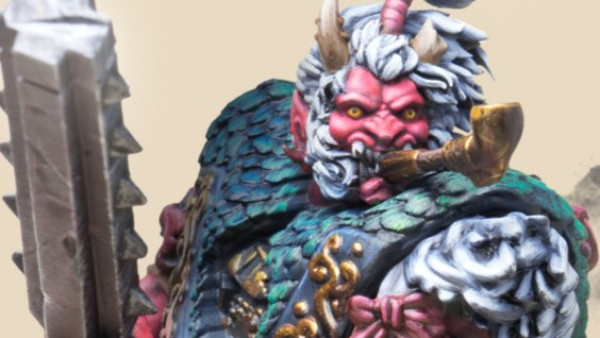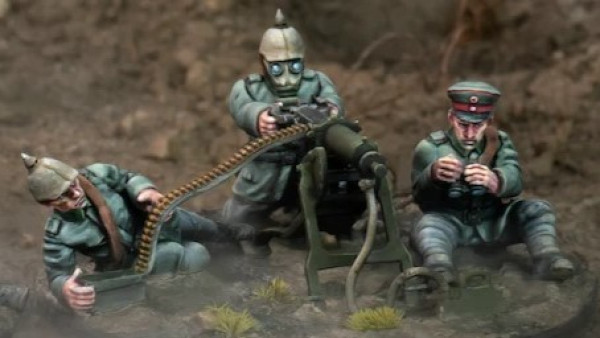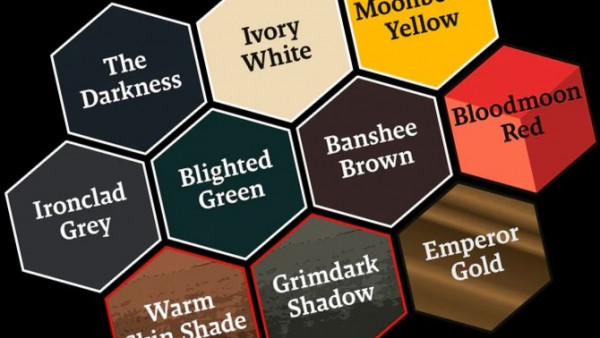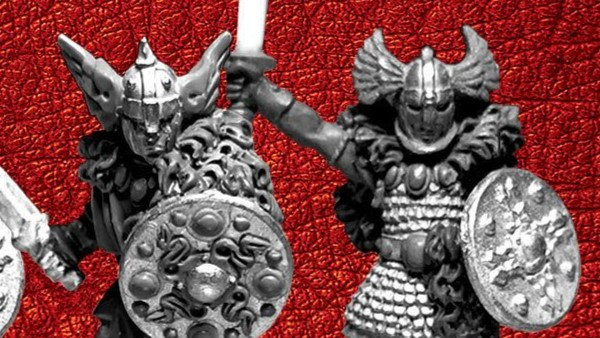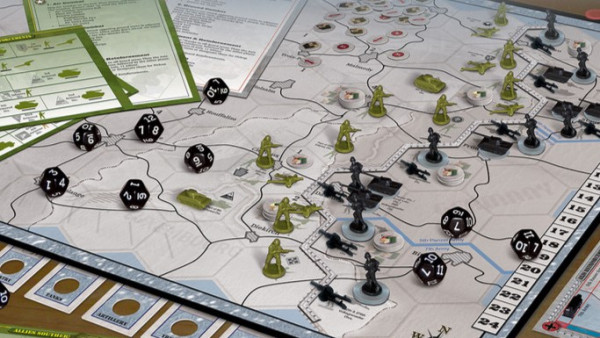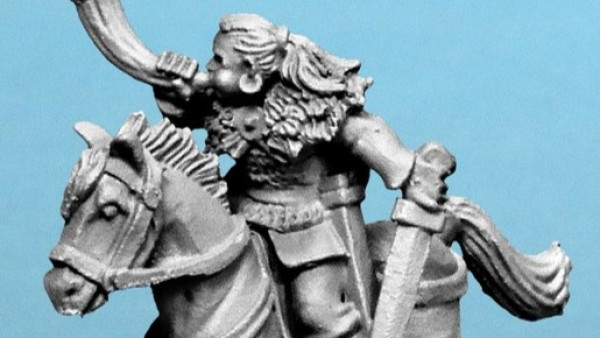Home › Forums › News, Rumours & General Discussion › Is wargaming just "make believe" with dice?
This topic contains 17 replies, has 10 voices, and was last updated by ![]() darkvernon 3 years, 4 months ago.
darkvernon 3 years, 4 months ago.
-
AuthorPosts
-
June 30, 2021 at 6:54 pm #1660046
A while ago, I bought the (excellent) one-hour skirmish wargames book by John Lambshead. I was particularly taken by the cards-instead-of-dice mechanic and at the time @warzan was getting all “diceless” on us, so I sent him a copy. Of course, it took exactly three nanoseconds for me to lose my copy so this weekend, after a respectable period of time had passed for my wife to accept I’d “properly lost” it, I bought another copy.
Reading through it, I still love the playing cards mechanic. But something came through that I’d missed the first time around – it’s talked about as a generic randomiser; you (and your opponent) decide what you want to do, then draw cards to determine how successful (or otherwise) your little tabletop men have been.
Which got me to thinking – as I’ve been writing AI for my own tabletop game app, and playing with a few people to test the strength of the rules, much of my focus (for the last thirty-odd years tbh) has been on how to play a game *to the rules* (Captain Alpha Strike @dignity knows all about this!).
Not so much playing the game, as a cinematic experience, but playing the game rules, as way of “winning” (by having as few unsuccessful outcomes against you). When shooting, I’ll position a character so as to maximise my chance of success, rather than “playing the story” – whether a wild west, a sci-fi skirmish or a WWII tabletop game, the focus (for me, and my gaming buddies it would seem) has been “where is the optimum place to put this guy so the action I want to complete next will be successful?”
Even when rules are included to force some characterisations onto the playing pieces, I find we instinctively try to find ways to mitigate against them (e.g. I’m moving my Blood Bowl troll; there’s a chance he’ll eat the goblin player instead of throwing him, so move this guy up here, and put this guy over there, and make sure there’s someone close by to grab the ball if he’s dropped….)
While this may increase my chance for success, it does tend to take away from the “flavour” of the game, making it more a generic “how to play against the ruleset” exercise, rather than the part game, part-RPG I always imagined tabletop gaming should be. (In my Blood Bowl example, wouldn’t it be much more enjoyable – for both players – if the troll ate the goblin, spat the ball out and a human player sprinted up the field to score? Then my orc team would have lost the game *because the troll ate the goblin and gave away a touchdown* and not because I failed to mitigate against it happening; the characters in the game drive the story that plays out on the tabletop, rather than the players pushing the pieces around)
And that’s something that One Hour Wargames handles really well (and one of the things I struggled with at first, as it’s not a comprehensive set of rules that covers every eventuality) – it basically says “look, you’re playing make-pretend on the tabletop, do what you like and at key points in the telling of your story, turn some cards and see what happens”.
It’s the “see what happens” that currently appeals to me. Not “do some mental arithmetic, choose the pieces that give you the highest modifiers, calculate a target score, then roll some dice and try to exceed a value” but more “use the cards to guide the narrative of your made-up storyline.”
Of course, this approach is utterly useless if you’re trying to build an AI (because you need hard and fast rules that a computer program can follow) but it feels like a much more fun way to play tabletop games.
Have I been missing the point for decades?
One of the nice things about building an AI opponent is that I can hide all of the mechanics behind the code, and respond only to the outcomes of the decisions – which makes playing against the computer feel more like “make-believe with rules” rather than I’m playing against the mechanics (since that’s all been abstracted and hidden from me anyway).
Am I the only one who has only just realised that there’s more fun to be had by playing the games as a five-year-old might play with their action-figures, just making the storyline up along as they go, and using the mechanics of the game to guide the story? I just feel like after (re)reading this book, I’ve been playing tabletop games all wrong for decades!
June 30, 2021 at 7:30 pm #1660049I guess in historical gaming, it would be what we used to call a ‘historical scenario’… but these have fallen to the wayside with the more populist historical based wargames.
All my wargaming is like an RPG. I’m drawn to games that force the period on a player and punishes him otherwise.
For me, its what makes historicals, historical.
Almost all the scenarios I’ve written over the years have been historical refights where certain ‘special rules’ will impart a sense of the actual engagement on the players. It doesn’t force the same result, merely adds in the historical difficulties faced.
And if you aint making pew-pew noises, then it aint right.
June 30, 2021 at 8:15 pm #1660074I still don’t think I’ve ever played a WW2 game that’s used points. It all been historical scenarios or based on scenarios that have been bath tabbed or expanded. I think the secret is to beat the scenario so to speak so even if you lose you can win by achieving a better result than happened in real life
July 1, 2021 at 8:38 am #1660128@blinky465 I feel like you’re describing what I would call “playing fluff” vs “power-meta-gaming”. I’m all on board with fluff gaming. Orcs charge in to close combat. Always. The Millennium Falcon is always piloted by Han Solo and Battlemechs will use “Death from above” every time when possible!
July 1, 2021 at 9:35 am #1660167@blinky465 “missing the point” kind of implies that there is a ‘right’ and ‘wrong’ way to play.
Some people simply like the pure mechanical approach and they will treat a game as an excercise in min/maxing your way to victory. The consequence of this can be that losing a game can be blamed on ‘bad rules’ or ‘bad dice’ as well as simply ‘bad tactics’.
I submit that you have simply discovered a new way to enjoy your games.
Some games lend themselves more towards narrative use, whereas others tend to push towards a more abstract mechanical focus.
And as such playing the ‘wrong’ style of game with a given set of rules will feel like the rules work against you …I suspect a narrative focused gamers is unlikely to complain about ‘bad’ rules because they’re more used to playing fast & loose with rules and their results, but a mechanics focused player will find faults regardless of how ‘complete’ a given ruleset claims to be.
Best example may be the much hated SPQR and even GW’s 40k & AoS. A narrative focused gamers isn’t too fussed if the rules aren’t perfect, because when push comes to shove they will house rule and get on with it. The mechanics focused gamers are more likely to complain out loud and stomp their feet because the system doesn’t offer them a perfect response.
A perfect / ideal game would allow both types of gamers to play the same game and still have fun.
Unfortunately most rules aren’t perfect and the players themselves don’t always have the patience to endure someone playing a different style. I also doubt both could ever be opponents in the same game and have fun …July 1, 2021 at 10:02 am #1660188@limburger – it does feel a bit like there’s a “wrong way” to play tabletop games, and maybe I’ve been doing it! Maybe it’s my programming background – I get absolutely no enjoyment from video games, for example, and my wife says I “play against what you see in the matrix” instead of playing the game. I’ve written video games since the days of the ZX Spectrum and everything looks like an array of bounding boxes and hit colliders and moving sprites to me!
Similarly, miniatures on a tabletop always looked like playing pieces with streams of statistics attached. I can’t help but (even subconciously) use mental arithmetic to work out probabilities of success before deciding on a move. But tabletop gaming isn’t just chess with dice modifiers and nicely painted minis, is it?
I think that’s what the one-hour-wargaming book pointed out – it doesn’t use modifiers, you simply increase your chance of success by drawing more cards and choosing the “best one” for the outcome you prefer. Note, not the highest, but the “best”. As the book explains, sometimes it’s preferable (in a multi-game campaign) to have your squad break and fall back, rather than stay and fight to the last man. Yield the battle to win the war, so to speak. Just this one mechanic (the ability to choose whether you’re broken or not) completely changed the whole point of tabletop gaming for me!
Yes, I may actually choose to be “beaten” in this *one specific scenerio* because it allows the story to develop; “choose to lose” is a great game mechanic, when lots of games focus more on grinding your opponent into oblivion no matter the cost to your own troops. That one-game “defeat” just becomes a setback in the backstory of a larger campaign – like when you played make-believe as a kid, and occasionally you let “the other side win” just keep things interesting!
July 1, 2021 at 10:39 am #1660213I’d argue that as long as both you and your opponent were having fun then it wasn’t ‘wrong’.
Maybe all you needed was the right set of rules written in a way that makes ‘narrative gaming’ sound more reasonable to you ?
It’s all too easy for rule writers to say “narrative gaming = do as you please”, but for some of us we need a bit more context than that just to understand exactly how to do it. (if that makes sense?)
Kind of like how the ‘golden rule’ in RPG’s tends to be “if you don’t like a rule ditch it”, but most books still manage to explain the rules in a way that makes you think you need to follow them to the letter (selling extra books with more rules doesn’t help either).
July 1, 2021 at 12:57 pm #1660256I got wrapped up in playing Malifaux this way. I regularly got beaten whenever I stood across from people in the shop and saw my Ramos crew slapped around regularly. I never paid it any mind as I liked the narrative of the mad scientist out with his mechanical minions and making things move on the table. The diceless mechanic with cards was a break and, though nit fully removed from the target math, the suit trigger variable made things interesting for results. Could I beat face with my 10 of Crows… Yes, but the 8 of tomes would give me this other result for more robo-spiders or rebuilding broken things.
I’m coming back from this as I want to win games against optimizers but I still have the feel of what it is to play the story of the game. It all cones down to fighting faction and fluff for these things.
July 2, 2021 at 10:02 am #1660428@blinky465 I love this question and discussion and would you be so kind as to let me borrow the question for this Wednesday’s Fumble in the Jungle chat in Discord.
July 2, 2021 at 10:49 am #1660445@panzerkaput – of course, but it does seem a bit weird to ask! The devil in me wanted to say “no, how dare you?” just because the idea of a bunch of people online all going “shhhhh you can’t talk about that” would be brilliant.
I’d recommend “one hour skirmish wargames” and if you don’t have a copy (or can’t find one of the preview pdf files on Google) here’s a pretty comprehensive review: http://daleswargames.blogspot.com/2018/12/one-hour-skirmish-wargames-review-part-1.html
Personally, I found the card-draw mechanism far more enjoyable than rolling dice. Maybe that’s what reinforced the “you’re telling a story” idea more than the binary “were you successful or not?” result of a dice roll – we played so that the player drawing the lowest number of cards draws first. Now the player drawing more cards draws each card, one at a time, each draw giving them another opportunity to “pass the test” (equally, ratcheting up the tension for the other player as they “survive” each subsequent card draw).
Likewise, when a character is hit/shot, they are “downed” and casualties are not resolved until the end of the turn. It means that when you hit a character there’s a chance they may only be “winged” and can come back to retaliate! Immediate resolution of dice rolls (where minis are removed from the tabletop after being killed) feel more like a video game (where a baddie flashes a few times then disappears when killed). Using this mechanic, both players witness a character taking a shot and being downed, and it can come as a surprise (to both) when they get back up again next turn! Again, this really felt more like a story-telling mechanism than the harsh “he’s dead, take him off the board” approach that dice results encourage.
July 2, 2021 at 12:36 pm #1660476@blinky465 Thanks there and I think it is only polite to ask.
I so know what you mean about One Hour Wargames and John Lambshead is a good friend of mine and I love the rules. I am very impressed and intrigued by other mechanic other than dice in games, both wargames and role play games. I think that people get lazy with simple dice mechanics in games but there are some interesting ways that they can be used. I personally like the way that Stargrunts II used them, based on different polyhedral dice based on skill of the target and modifiers based on range and cover.
At the moment I am in love with Moonstone and the card driven mechanics and the lovely use of different styles of attacks and defences.
July 2, 2021 at 3:59 pm #1660513For me it has always been primarily about the story not the mechanics. I’m capable of doing complex mental arithmetic but choose not to in a “fun” context where I want to relax and be in a mindset that has nothing to do with my work. My work involves running a business, and in a sense this is a “game” where I “win” if the numbers end up more positive than expectations, and “lose” if they are more negative, but with real world results that are about people’s livelihoods. I don’t want to replicate that mechanical, gamey feeling in my off time. So I tend to prefer “adventure” games, and treat the rules more as just a necessary evil to determine what happens in a fair an reasonably objective way. I am fortunate to have gaming buddies who think similarly and we are quite happy to ditch the rules in a game and just flip a coin or bring in a mechanic from another game if we find an existing rule is too complex or we can’t remember it, or simply can’t be bothered to look it up in the book mid game.
I wouldn’t class this as “better” or “more correct” than a “ruleslawyer” way of playing the game as these are our toys, its up to us how we play with them, and provided both opponents enjoy the social contract of the type of game being played, all is good. After all, many people play chess for fun, and good luck to them. I suspect this very mindset that there is a “correct” way somehow to play games is a product of the rules-first thought processing though? My perception is that the question is not a binary one, and entirely without a right or a wrong answer.
Also, sometimes, just sometimes, I do enjoy a game of chess, just because I am a human being and inconsistency is what we do!
I guess that’s what happens when an engineer asks a philosopher a question?
July 3, 2021 at 5:08 pm #1660671I love chess. I love limitations. I genuinely believe that having to work within very limited confines makes us more (not less) creative. I find programming microchips (with their limited memory and almost crippled ROM space) far more enjoyable than churning out code for the latest super-computers. I find the *gameplay* of games on the old ZX Spectrum far more interesting than modern “open world” MMORPGs. I love blues-based music, with it’s strict I-IV-V (or I-V-I-IV) style frameworks and it’s limited 5-note scales far more enjoyable to play and to listen to than freeform jazz. Give me limitations, and watch me shine! 😉
But I feel like I’ve carried this over – perhaps a little too much – into my tabletop gaming; looking for the tightest rules, to be able to make “most efficient” use of command points or action points, or whatever. Maybe I’m just late the party. But tabletop gaming isn’t “chess with nicely painted playing pieces” and the one hour skirmish games rulebook really rammed this point home:
As kids, when we ran around with our pals, shouting “pew, pew!” pretending to be Luke Skywalker and Han Solo, we didn’t let rules get in the way of the games we were playing – the story (that we were making up on the spot) was everything. It didn’t matter if we we “captured” by the kids playing Darth Vader and Boba Fett – in fact, we often encouraged it, so create interesting interactions between the “players”. The final outcome of the story was of no importance, other than making our make-believe story interesting and engaging.
I think this is how I’m going to try to play my tabletop games in future. If I’ve got a “duffer” on my team, instead of trying to move my other characters to mitigate against any poor results the lesser character(s) might generate, I’m going to embrace their “rubbishness” (yes, that’s a word) and move them about the table accordingly – so what if my Orc team gets thrashed in Blood Bowl? That’s because I had a stupid dumb troll and a couple of weasley, cowardly goblins, so of course they dropped the ball and tried to kill each other. Instead of trying to prevent or mitigate against them messing things up for my team, it’s time to embrace that as *part of the story*.
Ok, if I’ve got a particularly low intelligence, poor marksman on my side – I’m not going to play the other characters differently, against their strengths, to try to “balance the odds in my favour” – he’s going to wander about the board like the dumbass he is, messing stuff up, getting into trouble and actively pushing the odds in my opponent’s favour (because that’s what playing that character is all about).
@osbad makes a great point – these are our tabletop toys. I think it’s time I started playing with them like the toys that they are, not the sophisticated chess pieces I’ve been seeing them as!
July 3, 2021 at 5:10 pm #1660672@panzerkaput – I looked at Moonstone a little while back – again, the card-based mechanics piqued my interest. How does it play? I struggle a little with “fantastical whimsy” but the game itself looks really interesting.
July 3, 2021 at 5:16 pm #1660673@blink465 I havent played it sorry just watched let plays as clubs not open yet. I will let you know once they do
-
AuthorPosts
You must be logged in to reply to this topic.





























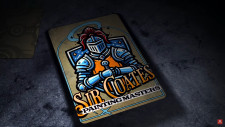

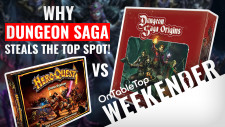
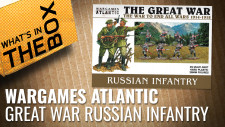

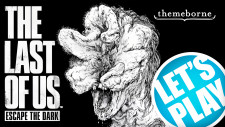
![TerrainFest 2024! Build Terrain With OnTableTop & Win A £300 Prize [Extended!]](https://images.beastsofwar.com/2024/10/TerrainFEST-2024-Social-Media-Post-Square-225-127.jpg)
